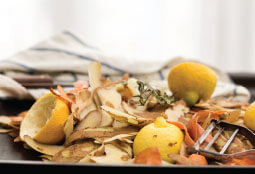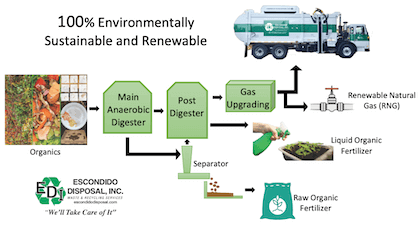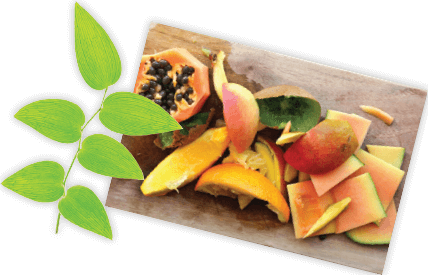EDI’s New Organics Recycling Program will Collect Food Scraps and Landscape Waste Mixed Together in a Green Organics Container
Commercial Organics Mailer
Organics Restaurant Guide
| Recyclable Organics Includes |
- grass clippings
- brush
- weeds
- hedge trimmings
- branches
- leaves
- palm fronds
- ice plant (in small amounts only due to weight)
|
- ivy
- flowers
- Halloween pumpkins
- Christmas trees (NO flocked trees)
- untreated and non-lead-based painted wood
- food scraps
- food-soiled paper
|
Place recyclable organics directly into your designated green collection container. Do not use any kind of plastic bags (including certified compostable or biodegradable bags) for any type of green waste, food waste, or other organics collection or disposal, as they contaminate the Anaerobic Digester! All organic material must be placed loosely inside the green container for collection. Paper bags are acceptable.
Please do not place any of the following materials in your designated green organics recycling container:
- No plastic bags.
- No trash or hazardous waste.
- No animal waste.
- No dirt, rocks, asphalt, concrete, sand, etc.
- No treated or lead-based painted wood or lumber.
Organic Waste

Organic waste is a renewable natural resource, and it mainly comes from yard and kitchen waste from homes, food waste, and industrial and commercial operations scraps. Mandatory recycling of organic waste is the next step to achieving California’s Zero Waste goals.
Recycling organics will be easy and convenient with EDI’s commingled Organics Recycling program. EDI has expanded its source-separated green waste collection to include recycling food waste. The service will allow customers to place food scraps in the same container as green waste. EDI’s new Organics Recycling program will be a foundation for your community to achieve State mandates, including AB 1826, AB 1594, and SB 1383, which are directly related to organics recycling in the State of California.
EDI’s Anaerobic Digestion Facility
Since 1967, family-owned and operated EDI has had a long-standing commitment to reducing environmental impacts through innovation. EDI’s state-of-the-art AD Facility began serving customers in early 2021, assisting your community in full compliance with State Mandates and keeping us on the Road to Zero Waste.
EDI’s Anaerobic Digestion Facility
AD is the natural process in which microorganisms break down organic materials such as food waste, green waste, fats, oils, and greases. Anaerobic digestion happens in closed spaces where there is no oxygen.
EDI’s commingled organics recycling program makes recycling organics easy and convenient. EDI has expanded the source-separated green waste collection to include food waste recycling. The service allows customers to place food scraps in the same container as green waste. EDI’s AD Facility is a foundation for your community to achieve state mandates, including AB 1826, AB 1594, and SB 1383, which are directly related to organic recycling in the State of California.
EDI’s Anaerobic Digestion and Food Waste Recycling Videos
Please watch our informative videos to learn more about EDI’s new AD Facility and Commercial Organics Recycling Program and how they will significantly impact the future of organic waste.
Why Recycle Food Waste?

Organic waste accounts for over 40% of the material in California’s waste stream. Organic material cannot break down when buried in a landfill, as in nature or compost pile. Instead, it decomposes without oxygen, releasing methane gas into the atmosphere.
Organic material (food scraps and yard waste) will soon be recycled when placed in green carts and then transported to EDI’s AD Facility, once completed, where it will be converted into renewable natural gas and fertilizer.
What Will Go in the Green Cart
Below are just a few examples of what can be placed in your green organics cart.
Food Scraps
Fruit, vegetables, meat, bones, dairy, eggshells, prepared food

Food-Soiled Paper
Napkins, tea bags, paper plates, coffee filters

Yard Waste
Plants, leaves, branches, grass


What Can You Do Now?
In the United States alone, a shocking 40% of food is uneaten, wasted, and discarded. We, as consumers, are the largest producers of food waste, believe it or not, exceeding grocery stores and restaurants combined! So, the smallest changes add up and make a huge difference. San Diego Food System Alliance is leading an initiative across San Diego County to reduce food waste and increase food donations to people. By visiting their website, at sdfsa.org, residents can find information on food recovery throughout the county, food donation guides, and resources.
Please visit our Resource Center for additional information, including informative videos, recycling guides, and service brochures.










